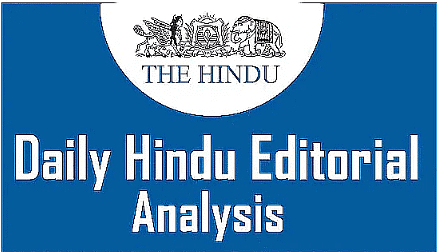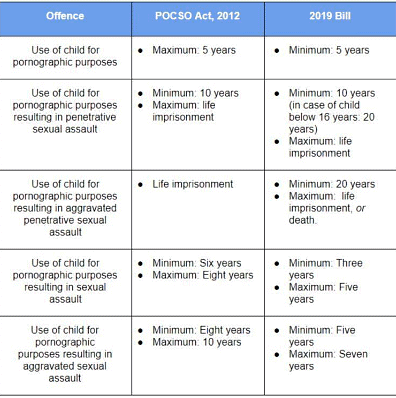The Hindu Editorial Analysis - 20th January 2023 | Current Affairs & Hindu Analysis: Daily, Weekly & Monthly - UPSC PDF Download

Judging a decade of the POCSO Act
Context
Ten years have passed since the Protection of Children from Sexual O#ences (POCSO) Act, 2012, enacted in consequence to India’s ratification of the UN Convention on the Rights of the Child in 1992, came into e#ect on November 14, 2012. The aim of this special law is to address o#ences of sexual exploitation and sexual abuse of children, which were either not speci!cally de!ned or in adequately penalised. Amidst the debate on the poor conviction rate under POCSO and a lowering of the age of consent from 18 years to 16 years (though rejected by the Central government), it is worth evaluating its impact on the ground.
Background of the POCSO ACT
- The Act took effect in 2012.
- The Act has been enacted to protect children from offences of sexual assault, sexual harassment and pornography and provide for establishment of Special Courts for trial of such offences and related matters and incidents.
- These provisions were not covered under the Indian Penal Code (IPC) or the Goa Children's Act, 2003, which was the only specific piece of child abuse legislation before the POCSO Act 2012.
- The act for the first time was amended in 2019 by The Protection of Children from Sexual Offences (Amendment) Act, 2019.
- This amendment to the Act enhanced the punishment to include death penalty for aggravated penetrative sexual assault of the child.

Features of the POCSO Act, 2012
- The Act is gender neutral and regards the best interests and welfare of the child as a matter of paramount importance at every stage so as to ensure the healthy physical, emotional, intellectual and social development of the child.
- It required mandatory police verification of each and every man or woman and the vicinity where children come, like schools, academies, sports activities centers, care homes or day care centers, and many others after regular intervals.
- Making a number of vocational courses and training curriculum available for the police officials and forensic experts, so that they attain greater expertise in their respective fields.
- People who traffic children for sexual purposes are also punishable under the provisions relating to abetment in the Act. The Act prescribes stringent punishment graded as per the gravity of the offence, with a maximum term of rigorous imprisonment for life, and fine.
- Making age-appropriate instructional material the part of their curriculum, to instruct them safety measures, control emotions, etc.
- The governments have additionally been asked to formulate zero-tolerance protection principle in case of sexual abuse of children.
General principles of the POCSO Act, 2012
- Right to be treated with dignity: various provisions under the POCSO Act reflect that it is very crucial to treat a child with dignity and utmost compassion
- Right to life and survival: Right to life is a fundamental right provided by Article 21 of the Indian Constitution. It is essential that a child should be protected from the evils of society and could be brought up in a secure environment.
- Right against discrimination: This is also a crucial fundamental right and an additional duty under the Indian Constitution. A child should not be discriminated against on the basis of sex, religion, culture, etc and the investigative and court procedures should be just and fair.
- Right to preventive measures: Children being immature in their growing stages should be well trained so that they become capable of preventing abuses against them thereby differentiating between what is right and what is wrong.
- Right to be informed: A child should be informed of the legal procedures that are being carried out for the conviction of the accused.
- Right to privacy: The main objective behind provisions like Section 23 is to protect the right to privacy of a child against whom any offence under the POCSO Act has been committed so as to maintain the confidentiality of the proceedings for the best interests of the child victim.
Importance of the POCSO Act, 2012
- Rising cases: The act was enacted when the cases of sexual abuse against children were rising.
- Separate legislation: With emerging dangers, it was significant to introduce separate legislation which could provide a reliable system for mitigating the number of such offences and punishing the perpetrators.
- Robust justice mechanism: The Act has been instrumental in providing a robust justice mechanism for the victims of sexual abuse and has highlighted the significance of child rights and safety.
Shortcomings of the POCSO Act, 2012
- Problem with the application of the last seen theory:
- The last seen theory can lead to wrongful conviction in several cases and therefore, it cannot be applied without circumstantial evidence.
- It was held by the Supreme Court in the case of Anjan Kumar Sarma v. State of Assam that the last seen theory is a weak piece of evidence and cannot be relied upon single-handedly.
- Unprepared investigation machinery:
- The investigation machinery in the child sexual abuse cases is not well acquainted with the procedure which leads to a faulty investigation.
- Silent on consensual sexual activities:
- In case of sexual intercourse with consent, one of which is minor, the partner who is not minor can be prosecuted under the POCSO Act as the consent of a minor is not considered relevant under this Act.
- False complaints by children are not punishable:
- Section 22 of the POCSO Act provides for the punishment to the persons who file a false complaint in order to humiliate, extort, threaten or defame another person.
- However, a child is exempted from any such punishment which is a loophole as many people take advantage of this exemption and misuse this provision.
- Pending cases:
- Although, the POCSO Act specifies that “the Special Court shall complete the trial, as far as possible, within a period of one year from the date of taking cognizance of the offence” under Section 35(2) but the number of pending cases is rising which is creating a huge problem in making the justice mechanism effective.
Way forward
- The need of the hour is to sensitize the public regarding child sexual abuse so that there is no reluctance in reporting these crimes.
- The investigating agencies should be well trained and professionals such as medical practitioners involved in the stages of investigation and trial should be efficient so as to leave any scope of negligence on their part.
- The POCSO Act already makes the procedure child friendly and this approach should be followed by the judicial officers, magistrates, and police officers so that the child victims could repose trust in them.
|
38 videos|5269 docs|1114 tests
|
FAQs on The Hindu Editorial Analysis - 20th January 2023 - Current Affairs & Hindu Analysis: Daily, Weekly & Monthly - UPSC
| 1. What is the POCSO Act and when was it implemented? |  |
| 2. What are the key provisions of the POCSO Act? |  |
| 3. How effective has the POCSO Act been in addressing child sexual abuse? |  |
| 4. What are the challenges faced in the implementation of the POCSO Act? |  |
| 5. Are there any proposed amendments or changes to the POCSO Act? |  |
















